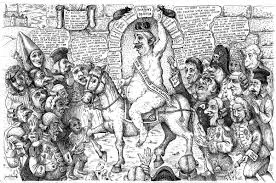NOTE: If you are visually impaired and would prefer to listen to a robotic audio version of what I have written, a download is provided for that purpose at the bottom of the post.
“So off went the Emperor in procession under his splendid canopy. Everyone in the streets and the windows said, “Oh, how fine are the Emperor’s new clothes! Don’t they fit him to perfection? And see his long train!” Nobody would confess that he couldn’t see anything, for that would prove him either unfit for his position, or a fool. No costume the Emperor had worn before was ever such a complete success.
”But he hasn’t got anything on,” a little child said.
”Did you ever hear such innocent prattle?” said its father. And one person whispered to another what the child had said, “He hasn’t anything on. A child says he hasn’t anything on.”
”But he hasn’t got anything on!” the whole town cried out at last.
The Emperor shivered, for he suspected they were right. But he thought, “This procession has got to go on.” So he walked more proudly than ever, as his noblemen held high the train that wasn’t there at all.
—Hans Christian Anderson, “The Emperor’s New Clothes”
To question is not, of itself, to challenge. That is, it is not, of itself, to call into question in the ordinary sense of "doubting" or "casting a skeptical eye upon."
Thus, to question authority does not, of itself, mean to undercut the claim to have authority, to be vested with it, as "Question Authority" was typically taken to mean on the old bumper-sticker that advised everyone to do just that.
Those who have themselves been "vested" with authority--which is to say clothed with the signs or marks of carrying some sort of officially approved, designated, or assigned position to make and enforce official decisions--experience being questioned, being "in-vestigated," as having their claim to being in positions of authority challenged, of course.
That is why, for example, one is ill advised to question the authority the police claim to possess. It is ill advised to do that, at least, unless one has is ready to arrested, handcuffed, thrown into the back -seat of a squad-car, hauled of to jail, and locked into some dismal cell, alone or with other "miscreants."
As a rule, before calling such vested authorities as the police, the courts, judges, school-teachers, degree-awarders, or credential-issuers into question one should carefully weigh the possible costs. One should consider carefully whether the risks outweigh the possible gains.
Sometimes, it is far wiser to call the claims of those who claim to occupy positions authority into question behind their backs, not to their faces. Subverting such claims surreptitiously may often be the wisest course of action.
* * *
Those who lay claim to vested positions of authority wear the vestments of their offices to cover their nakedness. They experience having their claims questioned as being stripped bare and exposed for who they really are--which is nobody special. Having their authority questioned threatens to expose all the sheer pretense and deceit of the pomp and circumstances with which they so readily seek to clothe and thereby cover themselves.
Vested authorities never like having their authority called into question, opened to being looked into and searched out. Their vestments are supposed to protect them from such perceived indignities.
* * *
To have their claims to authority questioned threatens to make those claims and those who make them ridiculous, something not to be taken seriously. Something deserving of being mocked and ridiculed. Those who claim authority cannot stand the thought of such a thing happening to them.
Such posturing figures are ridiculous and deserve to be ridiculed. Their claims to authority should always be questioned, and those who make them exposed to laughter.
They are never to be taken seriously
* * *.
May all of us always retain enough of the child in ourselves to point it out whenever we see that the emperor has no clothes.


